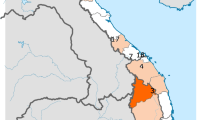
Overview
- Covers the theoretical framework and approaches around Traditional Ecological Knowledge
- includes many case studies from Asia
- Discusses conceptual issues around TE and its contributions
Access this book
Tax calculation will be finalised at checkout
Other ways to access
About this book
Similar content being viewed by others
Keywords
Table of contents (20 chapters)
-
Front Matter
-
Practices
-
Front Matter
-
Reviews
Editors and Affiliations
About the editors
Dr. Prabuddh Kumar Mishra is Assistant Professor (Sr. Scale) in the Department of Geography Shivaji College, University of Delhi. He has done M.A., M. Phil and Doctorate in Geography from Delhi School of Economics, University of Delhi. His research expertise includes natural resource management, watershed management, mountain studies, disaster management and livelihood-related issues. He has published 20 research papers, 4 books and 7 chapters in edited books (Scopus h index 4). He has been engaged in various environmental education programmes for schools and colleges.
Bibliographic Information
Book Title: Traditional Ecological Knowledge of Resource Management in Asia
Editors: Suresh Chand Rai, Prabuddh Kumar Mishra
DOI: https://doi.org/10.1007/978-3-031-16840-6
Publisher: Springer Cham
eBook Packages: Social Sciences, Social Sciences (R0)
Copyright Information: The Editor(s) (if applicable) and The Author(s), under exclusive license to Springer Nature Switzerland AG 2022
Hardcover ISBN: 978-3-031-16839-0Published: 02 January 2023
Softcover ISBN: 978-3-031-16842-0Published: 03 January 2024
eBook ISBN: 978-3-031-16840-6Published: 01 January 2023
Edition Number: 1
Number of Pages: XI, 348
Number of Illustrations: 14 b/w illustrations, 59 illustrations in colour
Topics: Geography, general, Environment, general, Knowledge Management, Agriculture



